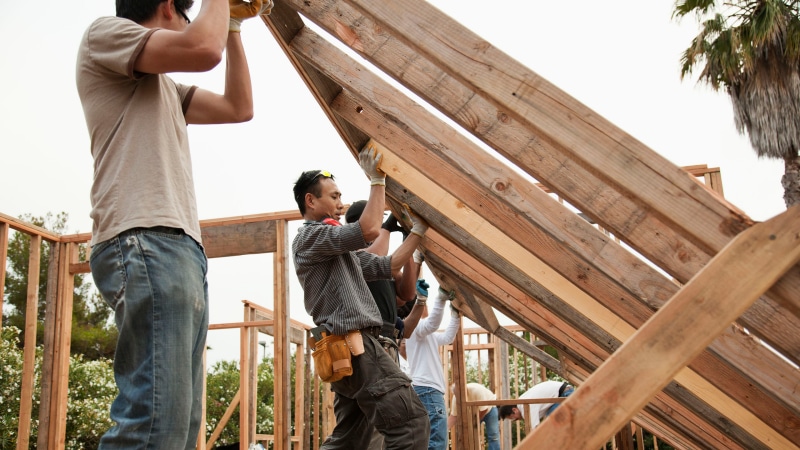A guide to restrictive covenants in real estate

Perhaps one of the most appealing aspects of homeownership is the power to make decisions about your property. This freedom, however, isn’t unlimited. Federal, state and local laws may place limits on the kinds of alterations you can make to your home. Additionally, your home may be subject to restrictive covenants, depending on the community where you live.
What is a restrictive covenant?
In real estate, a restrictive covenant is a legal agreement that applies to properties in a specified community. Covenants often arise from the control of a homeowners association (HOA), an organization in a planned community or condo complex that sets community rules. These rules place restrictions on what you can do with your property. They may also include requirements for maintenance.
The details of restrictive covenants are typically found in the deed to your home or in an HOA document known as the CC&R (covenants, conditions and restrictions). These CC&R agreements are legally binding, and violations may lead to fines or other consequences.
Types of restrictive covenants
While restrictions will vary from covenant-controlled community to community, they typically fall into three groups:
Restrictions on property alterations
These restrictions limit the kinds of alterations you can make to your property, such as the addition of external structures like pools and sheds. For example, a covenant may allow the construction of certain outdoor features but require setback lines, intended to keep your structure from getting too close to your neighboring properties and potentially helping avoid disputes.
Since restrictive covenants found in HOA rules often aim to preserve the look of a neighborhood, the rules may put aesthetic restrictions in place. These can involve limits on the types of colors you can use for exterior paintwork or set rules around the size and placement of signage or even holiday decorations. If you’ve always dreamed of owning a brightly colored home, you might want to check the covenants carefully before signing on the dotted line.
Restrictions on property usage
Other restrictions limit how you use the property. Covenants may govern the number of tenants you’re allowed or the types of pets you can keep. Certain dog breeds, for example, may fall afoul of restrictive covenants.
Covenants may also limit your ability to use your home as a rental property or as a place of business. Some covenants prohibit loud noises or gatherings after a certain time. Some may even forbid the use of certain utility items, such as clotheslines, around your property.
Required maintenance
Common maintenance requirements in covenant-controlled communities include lawncare, roof repair, fence painting and gutter cleaning. The community rules will determine how stringent these requirements are. Sometimes HOA fees go towards hiring maintenance staff to help with the upkeep of the HOA community.
Purpose of restrictive covenants
While restrictive covenants may reduce your flexibility as a homeowner, they can also come with upsides.
By preserving the visual character of a community and ensuring its upkeep, HOA restrictions may help maintain home values and make it easier to sell your home if you plan to move. Restrictive covenants might also help resolve disputes with neighbors by setting clear expectations for what constitutes a violation of HOA rules.
How common are covenants in real estate?
The number of covenant-controlled communities heavily depends on the area and can vary from state to state, though the existence of covenants may be more common than you might think. Types of developments commonly subject to covenant restrictions include planned communities, condominiums, attached and semi-detached structures such as townhouses.
How do I know if a property is subject to covenants?
To find out whether a property is subject to covenants, reviewing the property’s deeds is often a good place to start. You may also want to ask your real estate attorney to help.
Keep in mind that HOA rules can vary in strictness, and they may not suit everyone. As a homebuyer considering a property in a covenant-controlled community, it’s generally best to ask careful questions about the covenants in place before you make an offer.
What happens if you breach a restrictive covenant?
Unlike zoning regulations, restrictive covenants are not enforced by city or county officials. Nevertheless, these covenants, as overseen by the HOA on behalf of property owners in the community, remain legally binding.
The process for enforcement may vary, but typically involves warnings and fines for those who fail to follow the rules. In cases where you repeatedly breach a covenant or fail to pay a fine, the HOA may sue or file a lien against your property. If you attempt to sell your house, you will need to pay off the lien for the sale to proceed.
Protections against restrictive covenants
Note that restrictive covenants are themselves subject to legal scrutiny. Historically, discriminatory clauses in covenant restrictions were used to exclude certain groups from owning homes in specific neighborhoods on the basis of race and ethnic identity, a practice that was ruled unconstitutional in a landmark 1948 Supreme Court case.
Laws subsequently passed during the civil rights movement aimed to further prevent housing discrimination. These new laws extended protections against discrimination in housing policy on the basis of color, nationality, religion, sex, marital status and more. Because of these protections, certain clauses in a restrictive covenant may be unenforceable.
Additionally, there are legal protections available to homeowners against the arbitrary and selective enforcement of restrictive covenants. These are designed to prevent HOA rules from being used against individuals in a punitive way. You should consult a real estate attorney for advice specific to your circumstances.
In summary
Owning a home in a covenant-controlled community may come with more restrictions than homes elsewhere, but it can also offer benefits. Whether you’re a current homeowner or prospective buyer, it may be in your best interest to have a clear understanding of any potential restrictive covenants in place, as well as how they might affect your ownership of the property.



